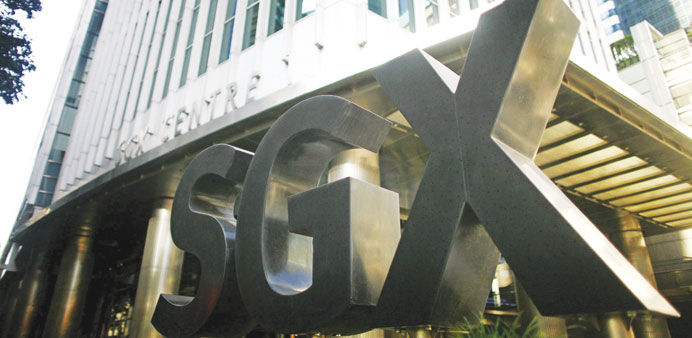A view of the Singapore Exchange office in Singapore. The SGX may have just begun its search for a new CEO but investors and brokers already know what change they want to see: the bourse stripped of its regulatory powers and a rebuilding of its stock market business.
Reuters/Singapore
Singapore Exchange (SGX) may have just begun its search for a new CEO but investors and brokers already know what change they want to see: the bourse stripped of its regulatory powers and a rebuilding of its stock market business.
Unlike other major financial markets, Singapore does not have a dedicated securities watchdog. Instead SGX is the front-line regulator and is in turn regulated by the central bank, the Monetary Authority of Singapore.
Although credited with developing a strong derivatives business, CEO Magnus Bocker’s six-year tenure has also been marred by a big drop-off in stock trading volume – hit by scandals that have called the bourse’s regulatory prowess into question as well as by ferocious competition from Hong Kong’s exchange.
For many in the investment and trading community, Bocker’s impending departure in June represents the perfect time for MAS to scrap the bourse’s regulatory role and establish an independent financial watchdog.
“SGX has an opportunity to reset its priorities,” said Michael Dee, a former investment banker and senior managing director at Temasek Holdings. “SGX has erred in giving a higher priority to their own commercial interests at the expense of investors and their protection.”
Asked to comment, SGX said it was aware there was a perception of a possible conflict of interest between its regulatory and for-profit roles but said it had a committee to manage any potential conflicts.
“SGX believes that the better we perform as a regulator, the better the quality of our market,” it said in a statement.
MAS said in a statement that exchanges in markets such as Australia and the US also have a degree of self-regulation, and that it monitors SGX’s regulatory role closely.
Even before Bocker made his announcement, calls for a new watchdog had gathered steam. A group of more than 1,000 brokers this month signed a petition asking Singapore’s Finance Minister to intervene in the industry’s declining fortunes with one of their main demands the separating out of the roles of market operator and regulator.
Perceived conflicts of interest were highlighted in a penny stocks scandal in 2013 when shares in three small firms that had seen huge run-ups plunged, wiping out S$8bn ($5.9bn) in market value in two days.
SGX was criticised for being too enamoured of strong trading volumes to take action early enough even though some brokers had of their own accord imposed trading limits on the stocks.
The exchange conducted a review in 2013 which concluded it had sufficient safeguards in place to handle conflicts of interest.
Accounting problems at Chinese firms between 2008 and 2011 also led to criticism that SGX had been too eager to attract new business without properly vetting new listings.
It said last year that it would introduce a new separate listing committee. The scandals tarnished the bourse’s reputation just as it wages an uphill battle against Hong Kong Exchanges & Clearing which has grabbed the lion’s share of big ticket listings in the region by virtue of its gateway position to China.
In 2014 the volume of shares traded on SGX plunged 21%, while over the past two years, retail investor participation has slid to slightly over 30% of market volume from just under half.
The drop-off has prompted SGX to introduce incentives for market makers, cut clearing fees and launch market reforms to try and boost volumes.
Analysts argue that if it is no longer a regulator, SGX can concentrate more on attracting new listings – particularly from Southeast Asia where it should be able to capitalise on its regional strength.
“If Singapore doesn’t take advantage of its current position, it’s possible that in a few years’ time, others in Asia will see it as a prime opportunity for acquisition,” said Andrew Tinney, CEO of KPMG’s Management Consulting practice in Asean.

